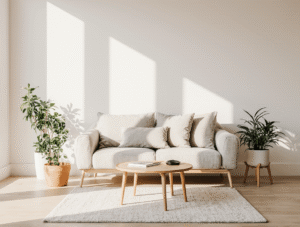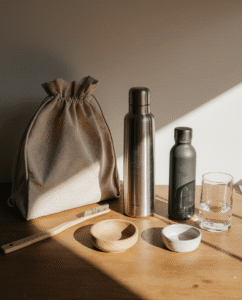In a world overwhelmed by material excess and environmental concerns, many individuals are embracing minimalism and sustainability as guiding principles for a more intentional and fulfilling life. These lifestyle choices not only reduce waste and clutter but also foster mental clarity, financial well-being, and a stronger connection with the environment. By prioritizing essential needs over unnecessary consumption, people can create a balanced and purpose-driven existence.

Why Minimalism and Sustainability Matter
Adopting a minimalist and sustainable approach to life offers numerous advantages, from mental and emotional well-being to environmental preservation. Thoughtful consumption leads to less stress, greater efficiency, and a reduced ecological footprint. On online forums, many people describe how simplifying their lifestyle helped them feel more in control, even during uncertain economic times.
1. Creating Mental Clarity Through Decluttering
A cluttered space often translates into a cluttered mind. Research published in Current Psychology reveals that excessive belongings can increase stress and decrease cognitive function. Decluttering creates a calming environment that fosters concentration and emotional stability.
One Reddit user shared that after donating half of their unused items, they finally felt they could “breathe” in their own apartment. What once felt heavy and chaotic turned into a space of peace and focus. Such stories highlight how small actions like organizing closets or clearing a desk can transform daily mood.
2. Reducing Environmental Impact with Sustainable Consumption
Consumerism has led to excessive waste and resource depletion. According to the United Nations Environment Programme, reducing consumption and opting for sustainable products play a critical role in minimizing pollution and conserving natural resources. By making mindful purchasing decisions, individuals contribute to a healthier planet.
For instance, choosing secondhand clothing or repairing electronics instead of replacing them can dramatically reduce waste. Many minimalists report that these decisions not only save money but also bring a sense of pride in living responsibly.
3. Financial Benefits of Intentional Spending
Mindless consumerism often results in financial stress. A Journal of Consumer Research study found that people who adopt mindful spending habits report greater life satisfaction and financial security. Embracing minimalism means choosing durable, high-quality items over short-lived, disposable products that contribute to waste.
I once tried a “no-spend month,” where I bought only food and essentials. The experiment showed me how many of my past purchases were unnecessary. Others in online discussions confirm similar outcomes, noting that such challenges reset their relationship with money and reduced impulse buying.

Minimalism as a Pathway to Sustainable Living
Minimalism and sustainability naturally complement one another. Reducing material possessions leads to conscious consumer choices that lower environmental harm.
1. Prioritizing Longevity Over Trends
Fast fashion and mass production contribute to excessive waste. Research in Nature Sustainability highlights that purchasing durable, well-crafted items significantly reduces landfill contributions and supports ethical labor practices. Opting for timeless, quality items helps break the cycle of disposability.
2. Simplifying Wardrobes with Capsule Collections
A capsule wardrobe consists of a curated selection of versatile clothing pieces. This practice streamlines daily routines, minimizes textile waste, and promotes sustainable fashion choices. A blogger once described how her 25-piece capsule wardrobe saved her 20 minutes every morning, while also cutting her annual shopping budget in half.
3. Shifting to Reusable and Eco-Friendly Alternatives
Replacing disposable products with reusable options—such as cloth shopping bags, glass storage containers, and stainless steel water bottles—reduces waste. Science Advances reports that only 9% of all plastic waste has ever been recycled, underscoring the need for sustainable choices.
Practical Steps to Integrate Minimalism and Sustainability
Embracing minimalism and sustainability does not require drastic changes; small, consistent efforts lead to lasting benefits.
1. Organizing and Simplifying Living Spaces
A well-structured home enhances productivity and relaxation. Opting for multi-functional furniture, natural materials, and minimalist décor fosters an eco-friendly atmosphere.
2. Mindful Eating and Reducing Food Waste
Food waste is a global issue. Thoughtful grocery shopping, meal planning, and buying locally sourced, organic ingredients reduce waste and support sustainability. Research in The Journal of Cleaner Production suggests that conscious eating habits significantly reduce food-related carbon footprints.
3. Lowering Energy Consumption
Simple habits—such as using LED lighting, unplugging devices when not in use, and relying on natural sunlight—lower energy consumption and contribute to a more sustainable household.
4. Adopting Sustainable Travel Habits
Eco-friendly travel practices, such as using public transportation, choosing ethical tourism experiences, and avoiding disposable plastics, help protect ecosystems. Research in Journal of Sustainable Tourism emphasizes that mindful travel habits play a vital role in environmental conservation.
The Psychological Benefits of Minimalism and Sustainability
Beyond financial and environmental advantages, adopting a minimalist and sustainable lifestyle fosters emotional well-being and mental clarity.
1. Reduced Anxiety and Enhanced Calmness
A simplified environment contributes to mental well-being. Personality and Social Psychology Bulletin reports that individuals with decluttered spaces experience lower cortisol levels and improved mood.
2. More Time for Self-Development
Owning fewer possessions frees up time for meaningful experiences. A study in The Journal of Positive Psychology found that investing in experiences rather than material goods leads to greater long-term happiness. Many minimalists share stories about using saved time to learn new skills, pursue hobbies, or spend more time with family.
3. Strengthened Connection with Nature
Sustainable living encourages outdoor activities, which have been shown to improve mood and reduce stress. Research in Journal of Environmental Psychology confirms that spending time in nature enhances overall well-being.
How to Transition to a Minimalist and Sustainable Lifestyle
Shifting toward minimalism and sustainability is a personal journey. Taking small, intentional steps ensures long-term success.
1. Thoughtful Decluttering
Instead of discarding items, donate, recycle, or repurpose them. This mindful approach prevents waste while promoting organization.
2. Conscious Shopping Habits
Before making purchases, ask whether the item adds value to your life. Prioritizing ethically sourced, durable products aligns with sustainability goals.
3. Digital Minimalism for Mental Clarity
Reducing digital clutter—such as unsubscribing from excess emails and limiting screen time—enhances focus and productivity. Many online communities share challenges like “digital detox weekends,” which help people regain balance.
4. Joining a Community for Support
Engaging with sustainability groups provides motivation and accountability. Participating in eco-conscious challenges and discussions fosters long-term commitment to mindful living.
Minimalism and Sustainability: A Movement Toward a Better Future
As awareness of environmental challenges grows, industries are shifting toward sustainable practices. More brands are prioritizing ethical sourcing, reducing waste, and developing eco-friendly solutions. According to Earth.org, conscious consumerism is reshaping global markets and driving positive environmental change.
By embracing minimalism and sustainability, individuals can cultivate a more fulfilling, purposeful life. Reducing unnecessary consumption and making thoughtful purchases protect the planet. Prioritizing meaningful experiences also supports personal well-being. Small lifestyle adjustments can create lasting impacts. These actions empower individuals to build a sustainable future. Through mindful choices, everyone can help shape a better, more intentional world.
Mindful Consumption: How to Stop Buying Things You Don’t Need?
K-Beauty Innovations: Trends and Ingredients Transforming Skincare

I’m Victoria, the creator behind Eva My Balance. Passionate about beauty, wellness, sustainable living, and mindful self-care. My mission is to inspire you to live consciously and beautifully—inside and out.




